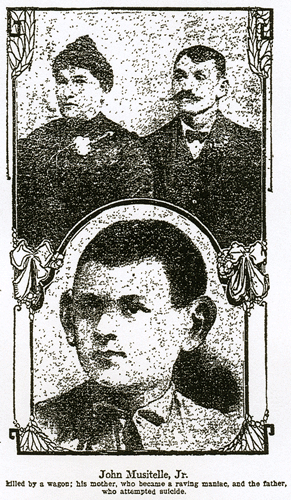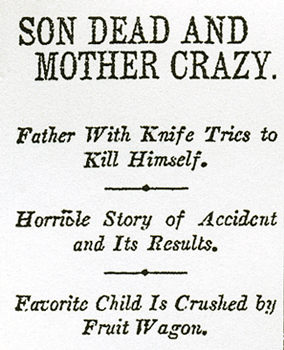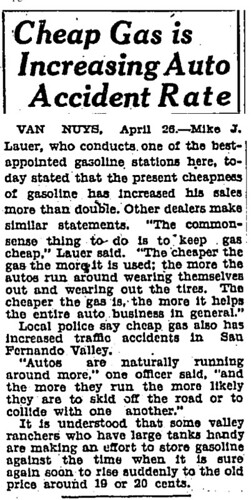Tag: accidents
A Bad Way With Horses

Nov.12, 1907
Los Angeles
Half a block from his home at 1131 Westlake, John P. Shumway Jr. was badly injured when the carriage he was driving collided with the 11th Street trolley. Shumway was thrown about 20 feet, striking the pavement head-first, and the horse ran for the stable, pulling what was left of the smashed carriage, witnesses said.
Shumway was carried to his home, where his father, Dr. John P. Shumway, treated him for a concussion, bruises and cuts. A year later, the family filed a personal injury suit against the Los Angeles Railway, seeking $10,355 ($204,938.83), although The Times failed to report the outcome of the trial.
Whether Shumway was a troublesome sort before is unclear, but his problems continued. In 1909, he was arrested for passing a forged check for $25 at the Pioneer bar on North Main Street. He claimed that he was given the check for work he had performed and was freed when he promised to repay the money.
A few months later, he was fined $60 for cruelty to a horse. Witnesses said Shumway overloaded a three-horse truck in South Pasadena and
Time to Buy a New One
Danger Point

Oct. 31, 1907
Los Angeles
John J. Mooney, 23, a Southern Pacific machinist who recently arrived from Butte, Mont., was aboard the West 2nd Street car on his way to be initiated in the Modern Woodmen of America when the brakes failed, sending the car into the southbound Spring Street trolley, killing him and injuring seven other passengers.
The intersection is known as a danger point because of the steep hill on 2nd Street, according to The Times, which noted that another fatal accident occurred there Dec. 24, 1905. Officials say the 2nd Street car stopped at Broadway, then proceeded toward Spring when the brakes failed. The motorman of the Spring Street car accelerated to avoid the oncoming trolley but couldn
Another Way to Grieve

 September 22, 1907
September 22, 1907
Los Angeles
A few days ago I posted about the Vance family who, having lost their young son, responded to their grief with solemnity and rectitude, though in a manner unusual to the dictates of the age. More appropriate to the workings of 1907, perhaps, is the mayhem that ensued after the Musitelles of 812 Howard Street lost their little John.
Mr. and Mrs. John Musitelle have five children; four daughters, and their favorite, youngest child John Jr. Musitelle, a fruit merchant, often took little John on the wagon ride between their ranch in Fernando and the fruit markets east of Chinatown. The mother had admonished John Sr. to never let the boy out of his sight, but today, Musitelle entrusted the task to an employee, one Pete Gotelli. Musitelli had to stay in Fernando on business, and the boy, who was exhausted from playing, pleaded with his father to allow Gottelli to take him home. Musitelle consented.
Mrs. Musitelli waited at the corner of Macy and Howard for the arrival of her husband; when the Gottelli-driven fruit wagon arrived, Gottelli left the horses unhitched and fled (questioned later, Gottelli stated that he didn’t want to face the mother). There, in the carriage, little John appeared to be sleeping. It would be a long sleep—at the west end of the East Main Street bridge over the Los Angeles River, John had fallen from the wagon as it crossed the railroad tracks, and was crushed under its wheels. Mrs. Musitelle carried John to the couch inside, where he passed away.
“They have killed my Johnnie!” screamed Mrs. Musitelle, who in her rage became violent at all who came near. Neighbors had called the undertaker’s wagon from Pierce Brother’s, and as the boy was being loaded in, Mrs. Musitelle broke free from those restraining her and grabbed the boy back.
At that point Mr. Musitelle arrived home, and despite a desperate struggle, managed to stab himself in the chest, though without doing serious damage. Mr. and Mrs. were taken to another house, where Mrs. Musitelle insisted she did not recognize Mr. Musitelle. When she finally realized who he was, she accused him of killing the boy. Mr. Musitelle has stated that he will end his life at the earliest given opportunity.
We can only assume that, unlike the Vance family, the Musitelles will imbue their son’s funeral with every possible trapping of black-clad mourning.




